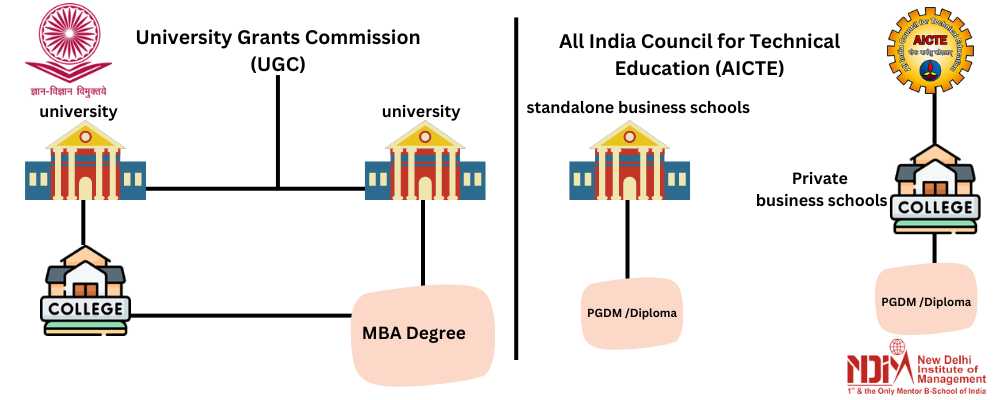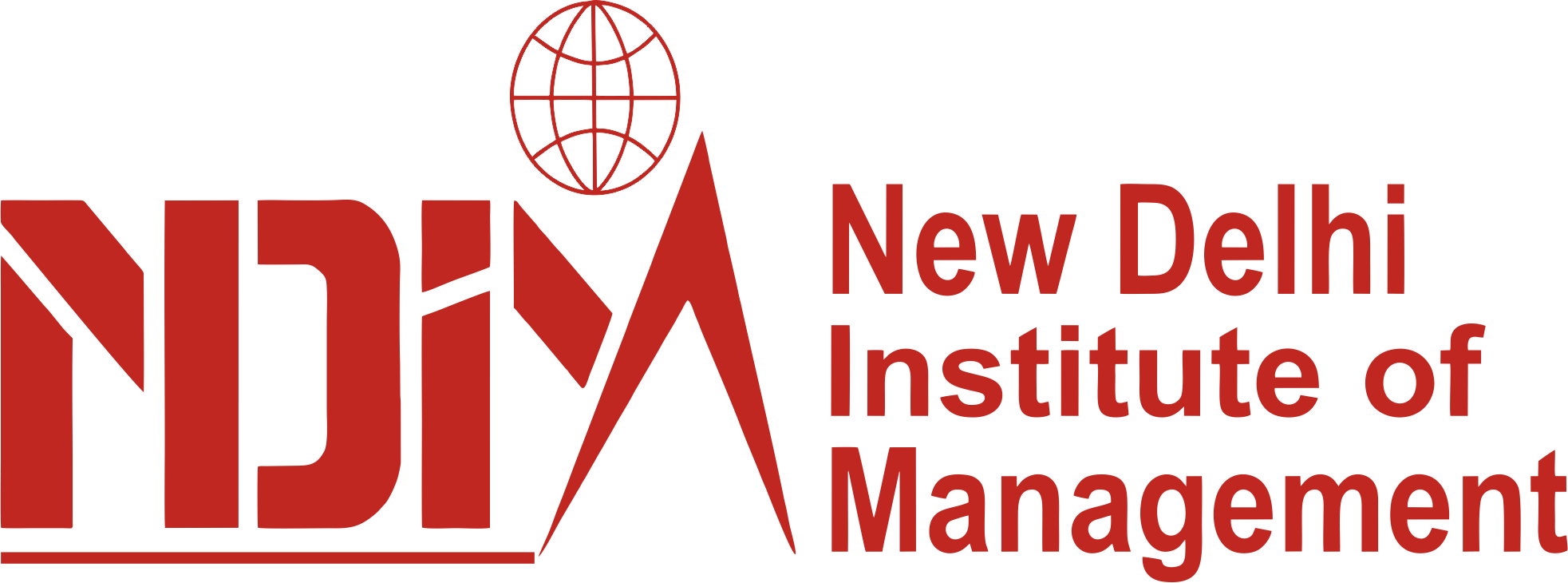MBA V/S PGDM
In the realm of higher education, specifically in the field of business administration, the two acronyms frequently come to the forefront MBA and PGDM. They may appear to be interchangeable initially, but there exist significant distinctions between the two. This article aims to delve into the nuances of MBA (Master of Business Administration) Vs PGDM (Post Graduate Diploma in Management), exploring their structures, accreditation, curriculum, and career implications.
Definition and Structure of MBA V/S PGDM :
MBA, short for Master of Business Administration, is a postgraduate degree provided by universities and business schools. It typically lasts for two years and encompasses a wide range of business topics including finance, marketing, human resources, operations, supply chain management, and strategy. The program strongly emphasizes theoretical knowledge and its practical application through case studies, projects, and internships.

On the other hand, PGDM, which stands for Post Graduate Diploma in Management, is offered by autonomous institutions, colleges, and management schools. Similar to MBA programs, PGDM programs also extend over two years and cover similar business subjects. However, PGDM programs tend to prioritize industry relevance, practical skills, and contemporary business trends. The curriculum is regularly updated to keep up with the ever-changing business landscape, which holds a unique significance.
Accreditation Between MBA Vs PGDM:
MBA programs are typically associated with universities and are acknowledged by regulatory bodies such as the University Grants Commission (UGC) in India or accreditation organizations like AACSB (Association to Advance Collegiate Schools of Business) and AMBA (Association of MBAs) internationally.
Whereas, PGDM programs, are not affiliated with universities but are recognized by the All-India Council for Technical Education (AICTE) in India. They often receive accreditation from entities like the NBA (National Board of Accreditation) and AIU (Association of Indian Universities). Many well-regarded PGDM institutions are also globally recognized and held in high esteem by the industry.
Curriculum and flexibility:
An MBA program typically has a more structured curriculum, with the university offering a limited number of courses or electives. This may limit the flexibility of course selection.
On the other hand, a PGDM typically has a more flexible curriculum, which allows students to customize their education based on their career aspirations and interests. This flexibility allows institutions to quickly adjust to changing industry demands and incorporate modern topics like data analytics and digital marketing, as well as entrepreneurship, into the curriculum.
Industry Interfaces and Practical Exposures:
MBA Programs Include Internships and Industry Projects: The degree of industry interface offered by an MBA program will depend on the university’s collaboration and resources. You may need to actively look for networking and internship opportunities.
Post-graduate Professional Development (PGDM) Programs: Post-graduate Program of Development (PGD) programs are highly focused on practical exposure. Institutions offering PGDM programs often have large-scale industry collaborations, expert guest lectures, and mandatory internships/industry projects. Practical experience helps students to bridge the gap from theory to practice, improving their employability and global recognition and mobility.
Global Recognition and Mobility:
MBA: MBA degrees from reputable universities enjoy widespread recognition globally and facilitate international mobility and networking opportunities, especially when backed by strong alumni networks and international partnerships.
PGDM: The PGDM course boasts significant global recognition and mobility, providing graduates with ample opportunities for international career advancement. With its esteemed reputation, PGDM opens doors to diverse job prospects worldwide, enhancing professional growth and marketability. Graduates equipped with PGDM credentials enjoy increased visibility in the global job market, attracting attention from multinational corporations and esteemed organisations. As a result, PGDM degree graduates often find themselves in high demand across various industries on a global scale. With its international recognition and versatility, PGDM offers graduates the chance to thrive in dynamic and competitive global markets.
Career Implications:
The career implications for MBA and PGDM graduates vary based on several factors, including the institution attended, specialization chosen, and individual career goals. Generally, MBA graduates often pursue leadership roles in established corporations, leveraging their comprehensive business education and prestigious degrees to secure high-level positions. On the other hand, PGDM graduates, while they may not have the same level of global recognition as MBA graduates, often excel in niche industries or emerging sectors, leveraging their specialized skills and industry-focused curriculum to carve out successful careers. Additionally, PGDM graduates may find themselves more adaptable to changing market demands and global trends due to the practical and flexible nature of their program. Ultimately, both MBA and PGDM graduates have the potential to achieve significant career success, with their respective degrees offering unique pathways to professional advancement.
Conclusion:
While MBA and PGDM are both excellent business management programs, they differ in structure, accreditation, and curriculum, as well as in career implications. The right choice for you will depend on your preferences, career goals, and the reputation of your chosen institution. PGDM programs offer several advantages over traditional MBA degrees, including greater industry relevance, practical orientation, flexibility, industry connections, global recognition, and entrepreneurial focus. Prospective students should carefully consider their career goals and preferences to determine which type of program aligns best with their aspirations
NDIM, a leading PGDM college in Delhi approved by AICTE, has been instrumental in nurturing the aspirations of numerous aspiring managers and facilitating their advancement in the corporate arena. With a commitment to holistic education, the institute not only prioritizes theoretical knowledge but also fosters the comprehensive growth of its students, preparing them to navigate the complexities of the corporate landscape adeptly. Recognized as the premier institution in India for its Corporate Interface by AICTE-CII for three consecutive years, NDIM prides itself on its impeccable 100% placement record, verified by the Advertising Standards Council of India. To know more, visit our website at https://www.ndimdelhi.org/.
MBA stands for Master of Business Administration, while PGDM stands for Post Graduate Diploma in Management. The primary difference lies in their affiliations: MBA programs are offered by universities, while PGDM programs are provided by autonomous institutions, often management schools.
Yes, both MBA and PGDM programs are recognized by the industry and are considered valuable qualifications. However, the reputation of the institution offering the program and its accreditation status also play significant roles in determining the recognition and value of the qualification.
PGDM programs generally offer more flexibility in terms of curriculum design and course structure. Institutions offering PGDM programs can update their curriculum more frequently to align with industry demands, whereas MBA programs may have a more standardized curriculum set by the university.
Yes, you can pursue a Ph.D. after completing either an MBA or PGDM. However, universities may have specific requirements for admission to their doctoral programs, which may include research experience, academic performance, and other criteria beyond the type of degree earned.
Generally, MBA programs tend to be longer in duration compared to PGDM programs. MBA programs often span two years or more, while PGDM programs can vary in duration, ranging from one year to two years, depending on the institution offering the program.
Deciding between an MBA and PGDM depends on your career goals, preferences, and individual circumstances. Consider factors such as program duration, curriculum flexibility, teaching methodologies, international exposure, career prospects, and the reputation of the institution offering the program. It’s essential to research and compare multiple programs before making a well-informed decision that aligns with your aspirations and ambitions.
MBA programs are typically associated with universities and are acknowledged by regulatory bodies such as the University Grants Commission (UGC) in India or accreditation organizations like AACSB (Association to Advance Collegiate Schools of Business) and AMBA (Association of MBAs) internationally. Whereas, PGDM programs, are not affiliated with universities but are recognized by the All-India Council for Technical Education (AICTE) in India.
PGDM is a Diploma and is equivalent to MBA from any Indian University. Exams are conducted by affiliated University. PGDM institutions are authorized by AICTE to conduct the exams.


